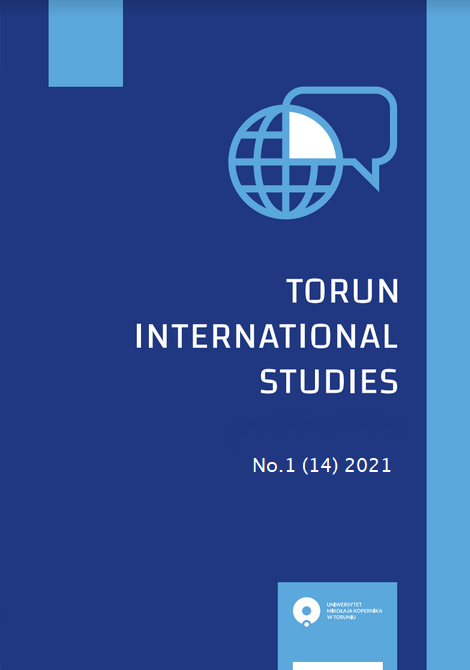THE CONSTITUTION IN THE SHADOW OF A GUN: HISTORICAL AND LEGAL VIEWS ON MYANMAR’S COUP D’ÉTAT
DOI:
https://doi.org/10.12775/TIS.2021.008Słowa kluczowe
Myanmar, Regime Change, Tatmadaw, Constitution, Democracy, Aung San Suu KyiAbstrakt
The Tatmadaw’s military takeover in Myanmar on the 1st of February has marked a significant step back in the country’s path towards democracy. Several doubts are raised as to why the military has decided to dismiss the institutional changes that it agreed to grant the country after the Saffron Revolution of 2007 in the first place. This paper seeks to examine the current military takeover in Myanmar through the lenses of its complex post-colonial history, marked by the continuous evolution of various intra-state stakeholder’s interactions, such as the Sangha, the Tatmadaw and the students. Subsequent to the historical analysis, we provide a legal outlook combing through the salient constitutional provision on the division of powers, aiming to understand if the balance thereof has been seen as an existential threat undermining the military’s hegemonic position over time. Finally, we aim to offer an account on why western expectations regarding Aung San Suu Kyi as a representative of Western liberal democracy could not be factually met. We conclude that the 2007 constitution institutionalized a political system that allowed wiggle room for non-military stakeholders to obtain further democratic concessions, that could result in a significant threat to the Tatmadaw’s rule. Such approach sheds outlook on the causes of the coup d’état and allows projections for the near future.
Bibliografia
AungMyoe, M. (2014). The Soldier and the State: The Tatmadaw and political liberalization in Myanmar since 2011. South East Asia Research, 22(2), 233-249. https://doi.org/10.5367/sear.2014.0205
Aung-Thwin, M. (2012). A history of Myanmar since ancient times: Traditions and transformations. Reaktion Books. https://doi.org/10.5367/sear.2014.0198
BBC News. (2021). Myanmar’s coup: US announces sanctions on leaders. https://www.bbc.com/news/world-asia-56015749
Bechert, H. (1995). To be a Burmese is to be a Buddhist: Buddhism in Burma. In R. Gombrich (Ed.), The World of Buddhism. Thames and Hudson.
Bowcott, O. (2019, November 11). Gambia files Rohingya genocide case against Myanmar at UN Court. The Guardian. https://www.theguardian.com/world/2019/nov/11/gambia-rohingya-genocide-myanmar-un-court
Chambers, P. (2014). Constitutional Change and Security Forces in Southeast Asia: Lessons from Thailand and Myanmar. Contemporary Southeast Asia, 36(1), 101-127. https://doi.org/10.1355/cs36-1e
Cheesman, N. (2003). School, State and Sangha in Burma. Comparative Education, 39(1), 45-63. https://doi.org/10-1080/0305006032000044931
Cheesman, N. (2009). The Rule of Law or un rule of law in Myanmar? Pacific Affairs, 82(4), 597-617. https://doi.org/10.2307/25608966
Crouch, M. (2019). The Constitutution of Myanmar: a contextual analysis. Hart Publishing. https://doi.org/10.1111/lasr.12479
Desaine, L. (2018). The Politics of Silence: Myanmar’s NGO ethnic, religious and political agenda. Research Institute on Contemporary Southeast Asia. https://books.openedition.org/irasec/877?lang=en
Ellis-Peterson, H. (2018). From Peace Icon to Pariah: Aung San Suu Kyi’s fall from grace. The Guardian. https://www.theguardian.com/world/2018/nov/23/aung-san-suu-kyi-fall-from-grace-myanmar
Feldman, N. (2016). Subverting Myanmar’s Constitution for its own good. Bloomberg Opinion. https://www.bloomberg.com/opinion/articles/2016-04-03/subverting-myanmar-s-constitution-for-its-own-good
Ferguson, J. (2015). Who's Counting? Ethnicity, Belonging, and the National Census in Burma/Myanmar. Journal of the Humanities and Social Sciences of Southeast Asia and Oceania, 171(1), 1-28. https://doi.org/10.1163/22134379-17101022
Fisher, J. (2015, November 13). Myanmar's 2015 general elections explained. BBC World News. https://www.bbc.com/news/world-asia-33547036
Fukuyama, F. (1992). The end of history and the last man. Free Press.
Hlaing, K. (2008). Challenging the authoritarian state: Buddhist monks and peaceful protests in Burma. Fletcher Forum of World Affairs, 32(1). https://dl.tufts.edu/downloads/0r967f30w?filename=qf85nn79h.pdf
Iwanek, K. (2019). Aung San Suu Kyi: A Moral democrat or a precolonial Queen? The Diplomat. https://thediplomat.com/tag/aung-san-suu-kyi-democracy-and-human-rights
Kaddy, J.F. (1953). Religion and politics in modern Burma. Far Eastern Quarterly, (12)2. https://doi.org/10.2307/2941976
Kyaw, N. (2019). Putting their guns on the scale: Constitution making in Burma under Military command. Chinese Journal of Comparative Law, (7)2, 309-332. https://doi.org/10.1093/cjcl/cxz010
Lubina, M. (2019). The Political Thought of Aung San Suu Kyi. Scholar Publishing House. https://scholar.com.pl/pl/ksiazki/3711-the-moral-democracy-brthe-political-thought-of-aung-san-suu-kyi.html
Matthews, B. (1993). Buddhism under a Military Regime: The Iron Heel in Burma. Asian Survey, 33(4), 408–423. http://doi.org/10.2307/2645106
McCarthy, S. (2008). Overturning the alms bowl: the price of survival and the consequences for political legitimacy in Burma. Australian Journal Of International Affairs, 62(3), 298-314.
Myat, M.M. (2019). Is politics Aung San Suu Kyi’s vocation? Palgrave Communications 5(50). https://doi.org/10.1057/s41599-019-0258-1
Phy Taw, N. (2008). Union of Myanmar, Commission for Holding the Referendum, Announcement No 10/2008.
Roberson, P. (2015, November 12). Can Aung San Suu Kyi control Myanmar’s military? CNN. https://edition.cnn.com/2015/11/12/opinions/myanmar-aung-san-suu-kyi-military/
Rogers, B. (2008). The Saffron Revolution: The Role of Religion in Burma's Movement for Peace and Democracy. Totalitarian Movements & Political Religions, 9(1), 115-118. https://doi.org/10.1080/14690760701856424
Selth, A. (2008). Burma's 'saffron revolution' and the limits of international influence. Australian Journal of International Affairs, 62(3), 281-297. https://doi.org/10.1080/10357710802286742
Shah, T.S., Stepan, A.C., & Toft, M.D. (2012). Rethinking religion and world affairs. Oxford University Press. https://doi.org/978-0-19-982797
Simons, M. (2019). Suu Kyi defends Myanmar against Rohingiya genocide accusations. The New York Times. https://www.nytimes.com/2019/12/11/world/asia/aung-san-suu-kyi-rohingya-myanmar-genocide-hague.htm
Smith, D. (1965). Religion and politics in Burma. Princeton University Press.
Steinberg, D. (2012). The Problem of Democracy in the Republic of the Union of Myanmar: Neither Nation-State Nor State-Nation? Southeast Asian Affairs, 220-237. https://www.jstor.org/stable/41713996
Stifel, L.D. (1972). Burmese Socialism: Economic Problems of the First Decade. Pacific Affairs, (45)1, 60-74. https://doi.org/10.2307/2755261
The Economist. (2021). Myanmar’s Coup turns the clock back a decade. The Economist Group Limited. https://www.economist.com/briefing/2021/02/06/myanmars-coup-turns-the-clock-back-a-decade
Pobrania
Opublikowane
Jak cytować
Numer
Dział
Licencja
Prawa autorskie (c) 2021 Torun International Studies

Utwór dostępny jest na licencji Creative Commons Uznanie autorstwa – Bez utworów zależnych 4.0 Międzynarodowe.
Statystyki
Liczba wyświetleń i pobrań: 1047
Liczba cytowań: 0



